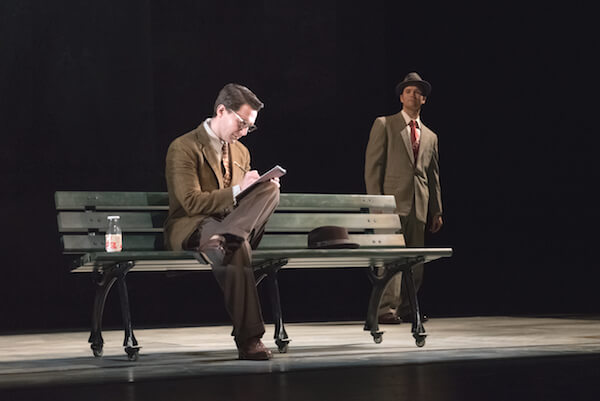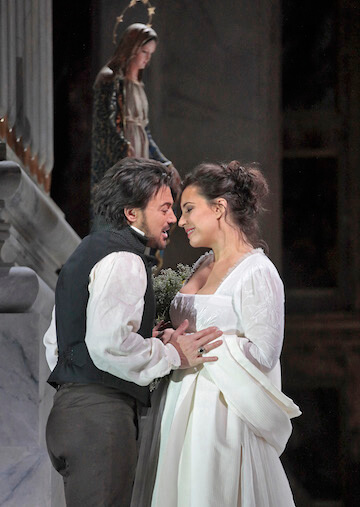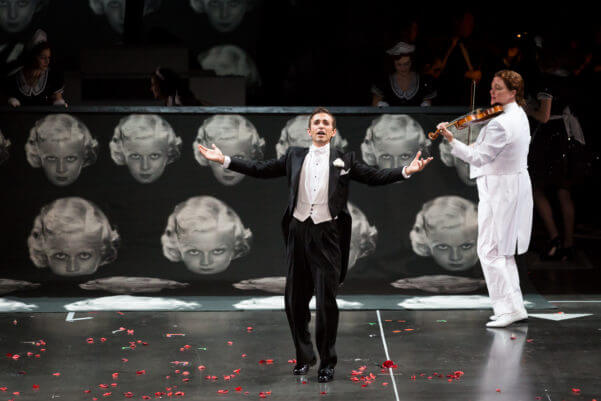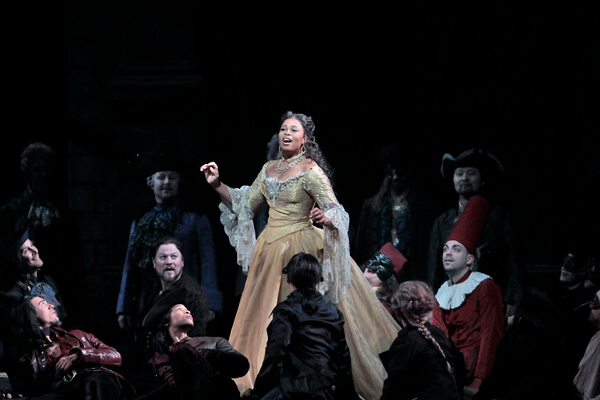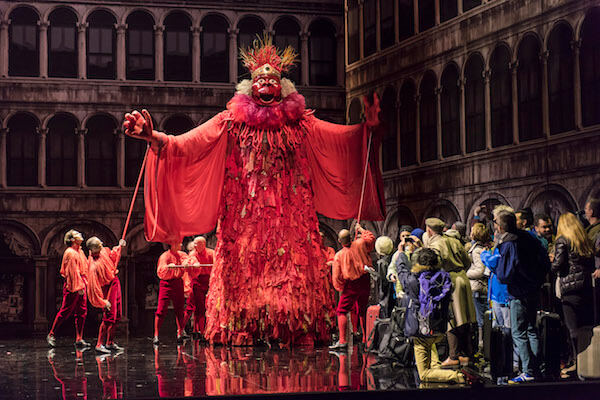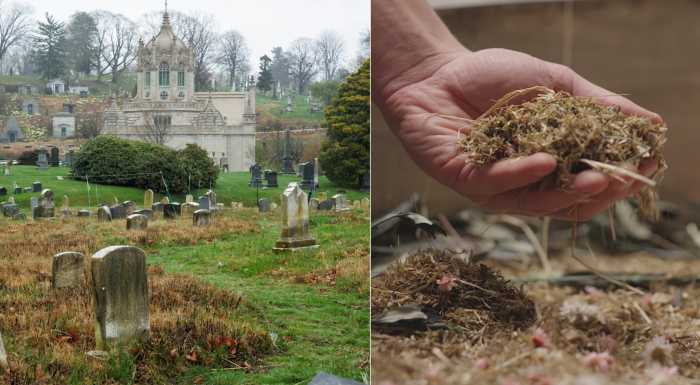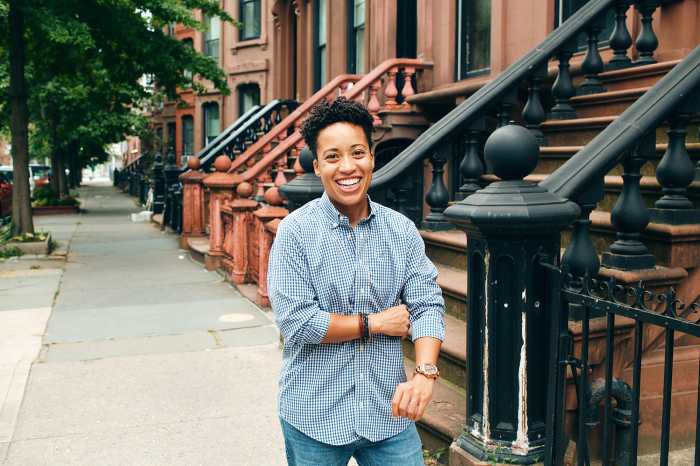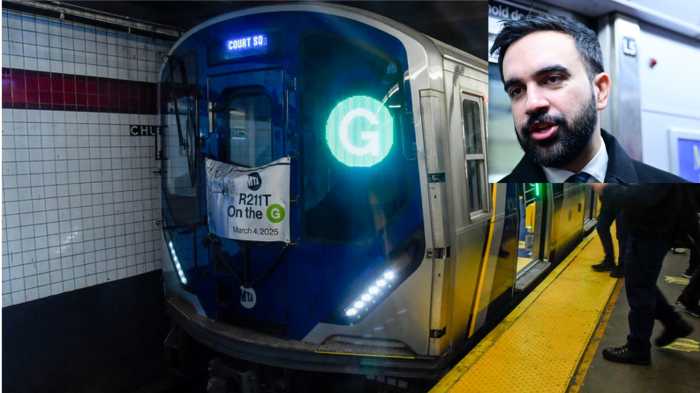Vittorio Grigolo and Sonya Yoncheva in Sir David McVicar’s production of Puccini’s “Tosca” at the Metropolitan Opera. KEN HOWARD/ | METROPOLITAN OPERA
Opera does personal drama and emotional conflict very well but intellectual, social, and political concepts are less suitable for musical adaptation. Two operas about a pair of lovers caught in a web of political power and intrigue opened this month. One was an expensive new production of “Tosca,” a standard repertory staple at the Metropolitan Opera. The other was the New York premiere of “Fellow Travelers,” a gay-themed contemporary opera set in the 1950s McCarthy era that used elements of the past to illuminate the present and future.
Puccini and his librettists cut down the history and politics in the source play “La Tosca” by focusing on the primal conflict of the three protagonists. Though lavish and realistic production values make a nice background for this opera, the crucial elements are three blood-and-guts performers going for broke and a director who knows how to make the effects land.
In April 2010, Jonas Kaufmann, Patricia Racette, and Bryn Terfel took over the opera, triumphantly ignoring the lamentable Bondy production and performing with chemistry and commitment. This season’s second “Tosca” performance on January 3 featured talented performers in a handsome production with all the makings of a great evening, except that they failed to connect with their roles and each other. Each performer was working moment to moment without an overarching sense of character or musical structure to guide them. Director Sir David McVicar is not entirely to blame — the disjointed rehearsal process saw the main players change up to two weeks before opening night. The New Year’s Eve gala opening night cast featured a second-choice star soprano, tenor, and baritone led by the third conductor assigned to this troubled venture. By the second performance things were settling in, mistakes were corrected, and the performances were improving but not enough electricity was being generated onstage.
In “Tosca,” “Fellow Travelers,” lovers caught up in their day’s power play intrigues
The handsome new sets and costumes by John Mcfarlane harken back to the 1985 Zeffirelli spectacular featuring realistic renderings of the original period settings in Rome circa 1800. This production mainly departs from tradition by raking the stage upward from stage left to stage right suggesting a world set askew. The tilted rake looks awkward and bizarre in the Act I church but is less jarring in the later acts where it fits the mise-en-scène better. Scarpia’s chambers in the Palazzo Farnese have distorted perspectives and exaggerated angles with twisted human figures painted on the walls giving a hellish cast to the atmosphere. Act III features a human-scaled rendering of the Castel Sant’Angelo ramparts that Zinka Milanov and Richard Tucker would be perfectly at home in.
Mcfarlane’s costumes are less felicitous, including a strapless black lace evening gown with jet beads for Tosca in Act II that looks like something worn by Mistinguett in a pre-World War I revue. Cavaradossi models a pristine white puffy shirt and pants that no painter would wear while working.
David Finn’s lighting is also problematic. In Act I, a lighting unit kept switching on and off randomly downstage left. In Act II, the windows in Scarpia’s chambers had light streaming in though the scene takes place at night, and in Act III the Roman night looked flat, dull, and murky.
McVicar’s direction keeps mostly to the standard “Tosca” playbook, with extraneous and fussy bits of eccentric stage business (often involving unnecessary supernumeraries), easily ignored, to let you know that he is “directing.”
On short notice, Sonya Yoncheva has definitely gotten Tosca into her throat and brain but I saw little sign that she had the role in her heart or gut. A petite raven-haired beauty, Yoncheva comes across as too much the generic leading lady in Act I, missing Tosca’s neurotic jealousy and diva hauteur. In Act II, there was a lack of desperation — Tosca is a trapped animal fighting for her honor and her lover’s life but Yoncheva never mussed her hair or broke a sweat. In some ways, Tosca is a precursor of the #MeToo movement, lashing back at a powerful male sexual harasser.
Yoncheva’s interpretation lacks prima donna authority and volatile danger — in time she may develop into a persuasive full lyric Tosca. The dark core of her multifaceted soprano has grown in size, easily filling out the expansive vocal line and dauntlessly surmounting Puccini’s large orchestra in the dramatic outbursts of Act II. The silvery radiance that overlaid that dark core has receded somewhat, replaced with some edge on high notes, a more pronounced vibrato, and a lack of a true pianissimo. However this lush, vibrant voice did great justice to the score, though less to the character.
While Yoncheva’s characterization seemed underdone like she wasn’t working hard enough onstage, Vittorio Grigolo’s Cavaradossi emerged overdone and was visibly working too hard. Grigolo has the right vocal timbre — sunny and ringing if a bit slender for his character’s more heroic outbursts. Grigolo brought too much temperament and too little musical and theatrical discipline to the role. He overemphasizes each individual word and note so that musical phrases lose legato flow and shape — this was exacerbated by loose and inaccurate rhythmic values. Grigolo’s natural charisma, Italianate tone, and evident commitment and passion make up for a lot of faults.
The imposing bulk of Zeljko Lucic’s rough-hewn baritone and physique are also positive assets. However, the experienced Serbian baritone sounded foggy and gray-toned with a dull, inert stage presence that sucked the life out of Scarpia’s confrontations that should crackle with tension and energy. His voice faded away behind the orchestra and chorus during the Act I “Te Deum” climax.
Conductor Emmanuel Villaume was also working moment by moment — just keeping the trains running on time without energizing the drama or guiding the singers to more artistically persuasive interpretations.
There is nothing about McVicar’s “Tosca” production that would stop a committed trio of performers and a fiery conductor from thrilling audiences. This crew didn’t gel or create sparks but hopefully they will improve over the run (including for the HD transmission on January 27).
The Prototype Festival presentation of the New York premiere of “Fellow Travelers,” a chamber opera with music by Gregory Spears and a libretto by Greg Pierce, also concerns a pair of lovers caught in a web of politics and desire. The difference here is that these lovers are not artists but two male political operatives whose sexuality places them in a precarious position during Senator Joseph McCarthy’s “Lavender Scare” in ‘50s Washington. Timothy Laughlin is a naïve young newspaper reporter with conservative religious and political views who catches the eye of State Department official Hawkins Fuller. In Laughlin, Fuller sees both a political speechwriter and a potential lover.
Aaron Blake and Joseph Lattanzi in Gregory Spears and Greg Pierce’s “Fellow Travelers,” performed this past weekend as part of the Prototype Festival at John Jay College’s Gerald W. Lynch Theater. | JILL STEINBERG
Laughlin and Hawkins are an example of opposites who attract but also eventually repel: Catholic Timothy is deeply conflicted about his homosexuality but accepts himself for what he is, remaining true to himself and his lover. Hawkins sees homosexuality as something he does, not who he is, and is equally flexible in his political affiliations, managing to adapt himself to the shifting political currents and mores. State Department workers like Fuller are called in for interrogation for “deviant practices,” the prevailing view being that homosexuality leaves employees open to blackmail that could lead to treason. In the process, careers and lives are destroyed and mistrust reigns. As remains the case today, right-wing demagogues are willing to use the gay community as a scapegoat in manipulating their followers by inciting fear and paranoia.
Spears and Pierce focus on the emotional arc of the two male protagonists, cutting down subplots, the flashback framing device, and much of the political background from the original novel by Thomas Mallon. Like Puccini, composer Spears conceives opera as a form of primal emotional communication and connection with the voice as the lead instrument. The first motive we hear is a persistent ostinato figure evoking tension, expectation, and unease but this is followed by a lyrical searching melody suggesting emotions trying to connect in an uncertain world. The vocal lines are melismatic, with repeated words to subtly altered notes; Spears has said he was emulating the longing lines of medieval troubadour songs with their plaintive texts about parted lovers and impossible desires. All of the musical techniques are rooted in traditional compositional techniques but are used in highly personal ways to communicate the story and emotions in a truthful manner. By being so true and honest to the characters rather than adhering to some abstract compositional style, Spears finds an individual musical voice that is totally accessible yet very unique. Pierce’s libretto is elegant and economical as is Kevin Newbury’s fluid minimalist production, courtesy of Cincinnati Opera, which commissioned the work that premiered in June 2016.
Tenor Aaron Blake acts and sings the role of Timothy Laughlin with clear focus and subtle nuance, revealing the fragile inner emotional world of the character. (Blake was also impressive vocally and dramatically as Louis in NYCO’s “Angels in America” last summer.) His acting in the final scene was a study in complete emotional devastation and isolation.
In contrast, baritone Joseph Lattanzi as Hawkins Fuller is all warm bonhomie and surface charm with something elusive and shifting behind the attractive facade. Lattanzi’s warm lyric baritone and Arrow Collar Man good looks give the character a seductive charisma that makes us empathize with all who come under his influence.
As the sympathetic Mary Johnson, who knows more than she wants to but still cares, soprano Devon Guthrie had a gleaming warm soprano that illuminated the intelligence and compassion of the character. An impressively versatile ensemble, which included Marcus DeLoach as Senator McCarthy and Vernon Hartman as Senator Potter (among other roles), provided a vital and specific background for this doomed gay affair.
The American Composers Orchestra led by George Manahan played the score with great attention to fine details and consistent musical energy. The freshness and energy of the performance was all the more impressive heard in the fourth performance scheduled over a three-day weekend at John Jay College’s Gerald W. Lynch Theater. “Fellow Travelers” continues its journey to the Lyric Opera of Chicago in March, proving that this new opera has legs.

